ASTANA – Ambassador of the Swiss Confederation to Kazakhstan and Tajikistan Salman Bal sheds light on the long-standing partnership and promising opportunities that lie ahead in an insightful conversation with The Astana Times. The two countries mark 32 years of diplomatic relations in June.
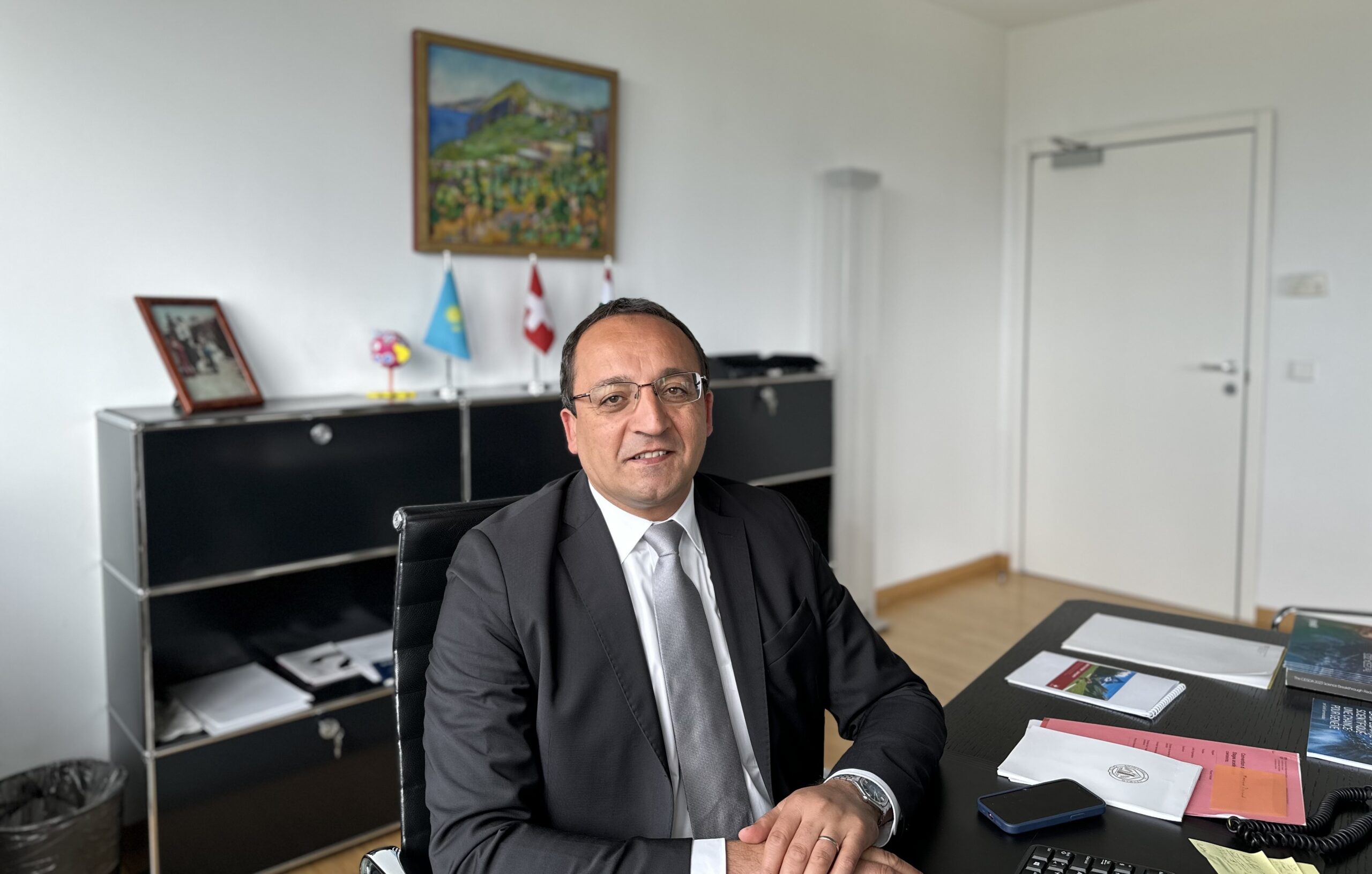
Salman Bal was appointed Ambassador of Switzerland to Kazakhstan and Tajikistan in September 2023. Photo credit: Nargiz Raimbekova / The Astana Times
“We have actually very good relations with Kazakhstan. I am sure that they will even become closer in the future because there is a big potential for further strengthening our relations and cooperation,” said Salman Bal, who began his mission in Kazakhstan in September 2023.
President Kassym-Jomart Tokayev paid an official visit to Geneva in November 2021. In February, Deputy Prime Minister – Minister of Foreign Affairs Murat Nurtleu paid a working visit to Switzerland, meeting leading Swiss companies and heads of international organizations. A month later, Yerlan Koshanov, chairman of the Mazhilis, a lower chamber of the Kazakh Parliament, led a parliamentary delegation to Switzerland.
In 2023, the head of the Federal Department of Foreign Affairs Ignazio Cassis paid a visit to Kazakhstan.
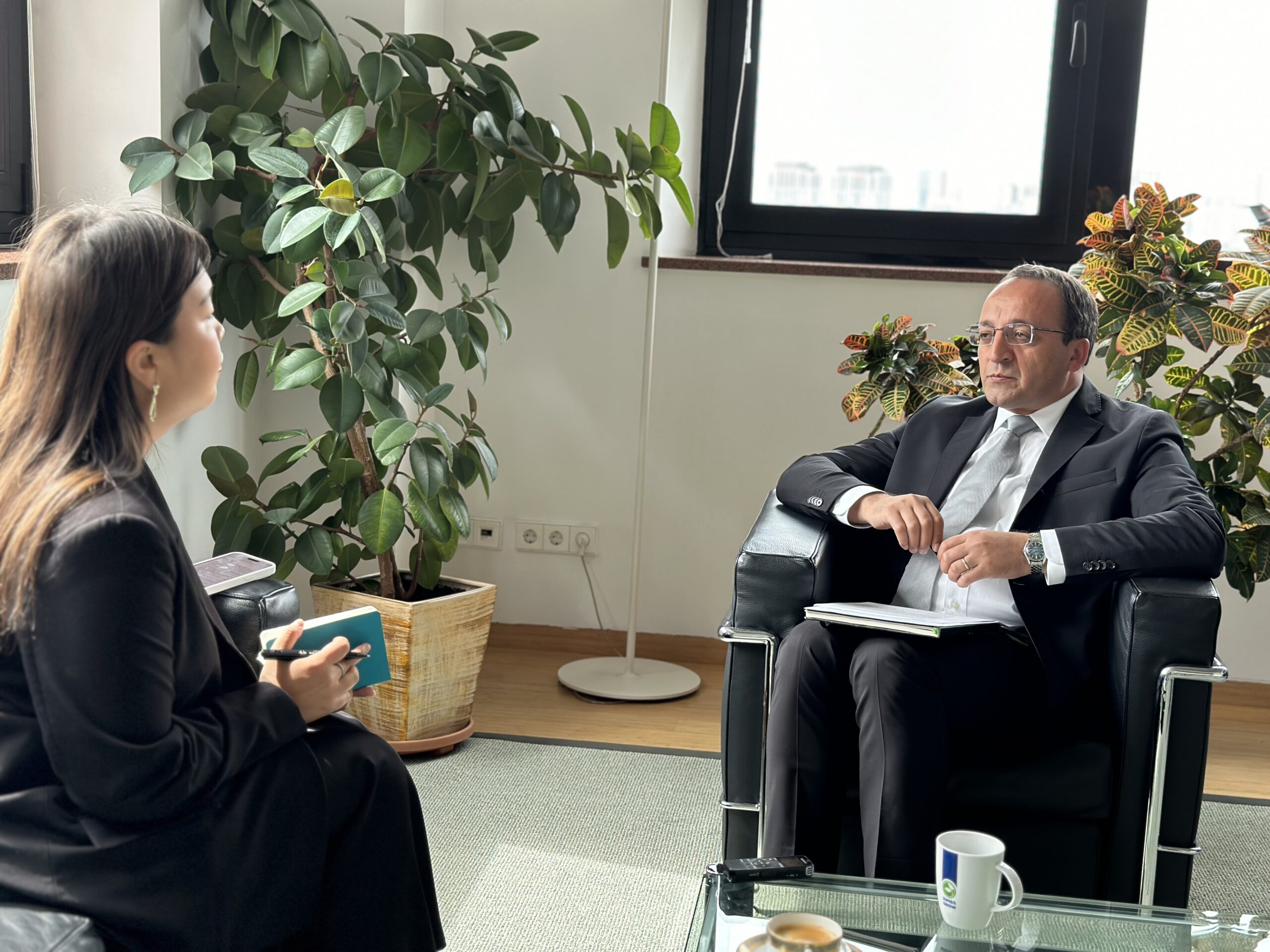
During the interview with the ambassador. Photo credit: Nargiz Raimbekova / The Astana Times
The ambassador stressed the long-standing partnership between Kazakhstan and Switzerland that is thriving on bilateral and multilateral levels.
“For many years, we have been working together globally and regionally for a better world. We also work in the fields of disarmament, environment, and human rights. Another area of focus here is also water,” he said.
He highlighted the Blue Peace initiative, which Switzerland launched in Central Asia in 2017, to promote cooperation in the region and effective management of shared water resources.
“Kazakhstan is also part of that. Just recently, when you had horrible floods in the north, we immediately contacted our Kazakh colleagues asking whether we could provide expertise or help one way or another. (…) my colleagues in Switzerland had a video conference with Kazhydromet to see how expertise and knowledge can be exchanged,” said the Swiss diplomat.
Far away, but similar
He pointed out that Kazakhstan and Switzerland share many similarities, beyond what most people initially realize.
“What I usually say to my counterparts in Kazakhstan is that at the beginning, when you see Switzerland and Kazakhstan, one has the feeling – two very different countries, nothing to do with each other. We have much more in common than you might think at first sight. Geographically, historically, and culturally, we are very different. But at the same time, we are both landlocked, both historically conditioned by the presence of big powerful neighbors,” said the ambassador.
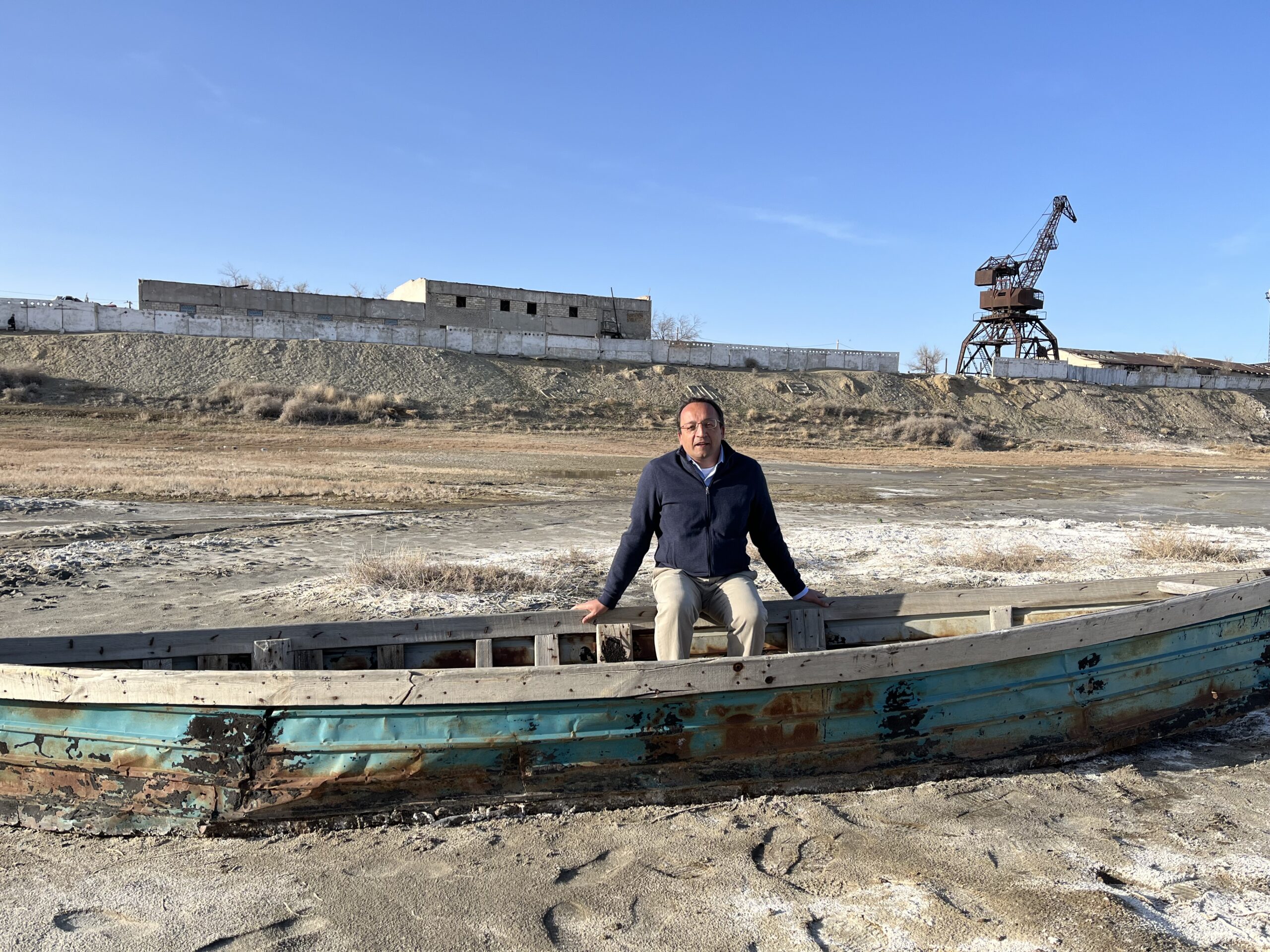
The ambassador on a boat at the seabed of the Aral Sea. Photo credit: Salman Bal’s personal archive
The two nations also take their strength in their diversity. “We are both multilingual, multireligious, and multicultural. One important element, which in Switzerland is still playing an important role today, and in the past maybe even more important, we are at the crossroads of north, south, and east, west,” said Bal, who was born in a Kurdish village in Turkiye and decided to become a diplomat at 16.
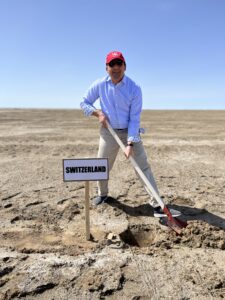
Planting a saxaul tree in the seabed of the Aralsea, where the water was 20 meters deep. Photo credit: Salman Bal’s personal archive
The ambassador highlighted that this diversity can pose challenges for a country, but with the right policies, it can be turned into an advantage. Countries need wise foreign and domestic policies that promote tolerance and inclusiveness, along with a strong framework for business, adherence to the rule of law, good governance, respect for human rights, and reliable public services and infrastructure.
“All these are important ingredients for success. In that sense, Kazakhstan has all the ingredients for success and we trust very much in the success of Kazakhstan,” said Bal.
Ambassador Bal closely follows the steps of reform in Kazakhstan. He suggested that to grasp a holistic picture of the reforms, one should go back to spring 2022. “Since then, Kazakhstan has adopted a set of reforms. They include political and governance reforms, and economic reforms, just to name some. Several other reforms are in the pipeline,” he said.
He noted that implementation is vital. He also stressed that political and economic reforms cannot be separated. Both are essential for progress.
“When you ask the private sector what is important for you, one of the first answers will immediately be political stability and respect for the rule of law. These are not necessarily only economic factors that are important for them. That is why economic and political [reforms] go together,” said Bal.
Bridge builders
“We are living in a fragmented world. Polarization is getting bigger and bigger,” he said.
Ambassador Bal said Kazakhstan and Switzerland are often perceived as bridge builders. He sees a common diplomatic approach in both countries – rather than defending positions for the sake of it, they seek solutions to complex situations.
“That is what makes the policy of those countries interesting – always try to find a pragmatic solution to get over a deadlock. At the moment, we have, unfortunately, too many deadlocks in international politics. I think the world needs more countries like that,” said the diplomat.
Top foreign investor
Kazakhstan and Switzerland boast dynamic trade ties. According to the Kazakh Bureau of National Statistics, in 2023, trade reached $1.38 billion, with Kazakh exports hitting $941.1 million. This is a slight increase from $1.35 billion in 2022. Between January and March this year, trade reached $391.1 million, an increase of 11.7%.
Switzerland also ranks as the country’s third largest foreign investor. According to data from the National Bank of Kazakhstan, Swiss investments have surpassed $34.8 billion since 2005, with around $2.2 billion in 2023.
“What is interesting to note is that over the last 30 years, 70% of foreign direct investment (FDI) in Central Asia was made in Kazakhstan, not only Swiss but in general. For me, that shows that there is a certain investment climate in the country that attracts investment,” he said.
Swiss investments traditionally focused on the mining and manufacturing sectors, but they also extended into other areas such as transport, pharmaceutical, chemical, agriculture, and food industries.
The transport industry is promising, and the two countries are keen to explore it. In December 2022, Stadler Rail, a major Swiss manufacturer of railway rolling stock, signed three agreements worth 2.3 billion euros (US$2.5 billion) with Kazakhstan Temir Zholy (KTZ) railway company to supply 537 wagons, maintain them for 20 years, and localize production.

A grand opening of a training center for laboratory diagnostics by Roche. Photo credit: nusom.nu.edu.kz
The ambassador said transport projects ultimately bring people together. “Yes, at the moment, we are talking about the Middle Corridor [Trans-Caspian International Transport Route] mainly in terms of exporting goods. But at the end of the day, it will also increase exchanges between people,” he said.
Bal noted it is encouraging that companies are increasingly choosing to manufacture and produce in Kazakhstan.
“This goes also along the lines of the reforms announced by President Tokayev in his speech [referring to a state-of-the-nation address] at the beginning of September last year,” he said.
According to the ambassador, this brings valuable know-how and expertise to Kazakhstan, contributing to the sharing of experiences. One such sharing took place in May, when Roche, one of Switzerland’s leading pharmaceutical companies, opened a training center for laboratory diagnostics at Nazarbayev University School of Medicine.
Bal said Central Asia, including Kazakhstan, remains relatively unknown in Europe, and there is limited general knowledge about this region. But he is optimistic that intensifying economic relations will help bridge this gap, bringing people closer together.
Education and cultural exchange
Promoting cultural exchange is one of the ambassador’s priorities.
“We need to know each other better. This is why promoting cultural exchanges within the framework of the possibilities and competencies of the embassy is among the priorities I have identified. Cultural exchanges are indeed an excellent tool to meet and know each other,” said Bal.
He noted that Swiss artists will play the typical Swiss musical instrument, the alphorn, in various public spaces in Astana on Aug. 1-2.
“I am looking forward to seeing many locals at the artists’ performances,” he added.
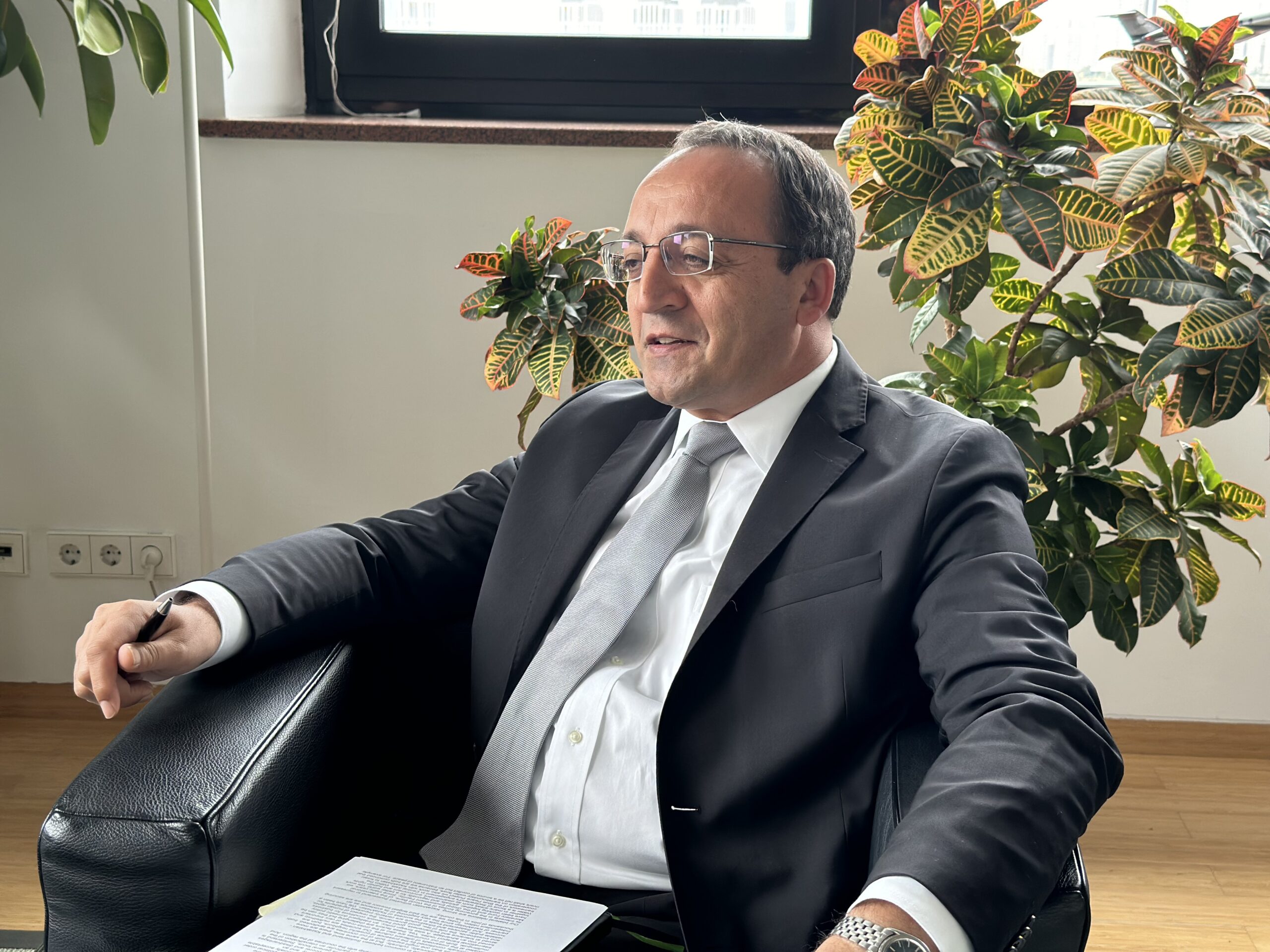
Salman Bal during the interview. Photo credit: Nargiz Raimbekova / The Astana Times
In terms of education, Bal noted more than 250 students from Kazakhstan studied in Switzerland through Bolashak, a presidential scholarship that sends talents abroad to study at the state expense, since 1993. Additionally, around 50 Kazakh students have benefited from the Swiss Government Excellence Scholarship for PhD and postgraduate studies.
Because of the decentralized system in Switzerland, cooperation usually occurs directly between universities or researchers, with minimal government influence. “We can bring people together, but then they have to take action,” said the diplomat.
The ambassador stressed the need to engage more in vocational training.
“That has been a strong element in our economy. This is also very important for small and medium-sized enterprises. In every economy, small and medium-sized enterprises are the backbone of the economy,” said Bal.
The ambassador has been exploring whether a similar vocational training system exists in Kazakhstan and whether it could be strengthened through the exchange of experiences. This is one of the primary fields he intends to focus on in his tenure.
Future priorities
The ambassador detailed what he considers essential and emphasized the importance of attracting more Swiss business and investment to Kazakhstan.
Another priority is promoting science and water diplomacy. “Science is advancing at a very high speed. We, governments, are always lagging behind,” he added.
According to him, reliable scientific evidence is also imperative for diplomats and politicians to make informed decisions and prepare for scientific breakthroughs.
Bal mentioned how the rise of major internet companies such as Google in the 1990s and early 2000s brought unforeseen issues with privacy and fake news decades later. Had governments anticipated these developments, they might have been able to implement regulations earlier.
“There is also a big potential for Kazakhstan because you have new IT companies, artificial intelligence, and technology with the latest developments that is booming,” he added.
Switzerland, which is often referred to as the “water castle of Europe” because major European rivers originate there, is also keen to foster cooperation in water diplomacy.
“Our offices in Uzbekistan, Tajikistan, and Kyrgyzstan, have big water projects. Kazakhstan, according to the statistics, is not considered as a developing country. That is why we cannot apply the same development instruments here,” he said.
In the meantime, Bal is enthusiastic about exploring Kazakhstan. A few months ago, he visited Kyzlorda in the south of Kazakhstan as part of a big delegation of European ambassadors. He also traveled to Almaty, Taraz, Turkistan, and Shymkent to discover the diversity of the country.
The Swiss diplomat also takes Kazakh language classes three times a week. He finds many similarities between Kazakh and Turkish, which he also speaks.
“The grammar is okay because it is very similar to Turkish, but the pronunciation. Kazakhs speak so quickly,” said Bal with a smile on his face.


